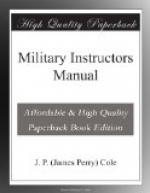When necessary to utilize separate urinals, a hole filled with stone and sprinkled daily with quicklime is sufficient for short periods. At night there should be a galvanized iron can placed in each company street and emptied before reveille each morning. This can must be disinfected by burning out, as must be the latrines when earth or sand is not used as a covering each time.
Pits must be covered daily with quicklime, ashes, earth and filled when within two (2) feet of the surface. Their position should be distinctly marked so as to prevent reopening.
It is a safe rule never to use an old camp ground, but select a new one, even if less conveniently located. Camp sites should be changed if it is found that the soil is becoming polluted, or if the ground is cut up and dusty from constant use.
The condition in which a camp site is left by an organization will clearly indicate the efficiency and discipline in a command.
CHAPTER 10.
Personal Hygiene and First Aid.
This is a purely arbitrary grouping of topics for the purpose of saving space. Either of the topics mentioned could be treated at length; detailed information will be found in any of the reference books mentioned in the bibliography.
PERSONAL HYGIENE means “the preservation of health by attention to the care of the body;” it is determined by the formation of correct habits. Cleanliness of person, clothing and bedding should become a habit of life with the soldier; but some men will always require watching and admonition. These habits are: personal cleanliness; regulation of diet; avoidance of excesses (eating, drinking and sexual matters); wearing suitable clothing; keeping the bodily processes at work (kidneys, bowels and skin); taking sufficient exercise, preferably in the open air; rest of body and mind, with recreation for the latter; maintaining the surroundings in which one lives in a cleanly state.
BATHING is easily the most important requirement in matters of personal hygiene; men should bathe as often as conditions of life in barracks and camp will permit. On the march a vigorous “dry rub” with a coarse towel will often prove an excellent substitute when water is not available. Teeth should be cleaned at least twice daily. Clothing should be kept clean, particularly underclothing. Diet is not a matter which a soldier can determine to any extent for himself; but he can follow a certain few precautions:
1. Don’t eat hurriedly;
chew the food properly.
2. Don’t overload the
stomach.
3. Don’t eat green or
overripe fruit.
4. Don’t eat anything
while away from camp or barracks, whose
materials or manner of preparation seem questionable.
5. Don’t bring a “grouch”
to the table with you.
6. Don’t eat on the march;
don’t drink too much water on the march.




